Top 7 Keyword Metrics to Track for SEO Success
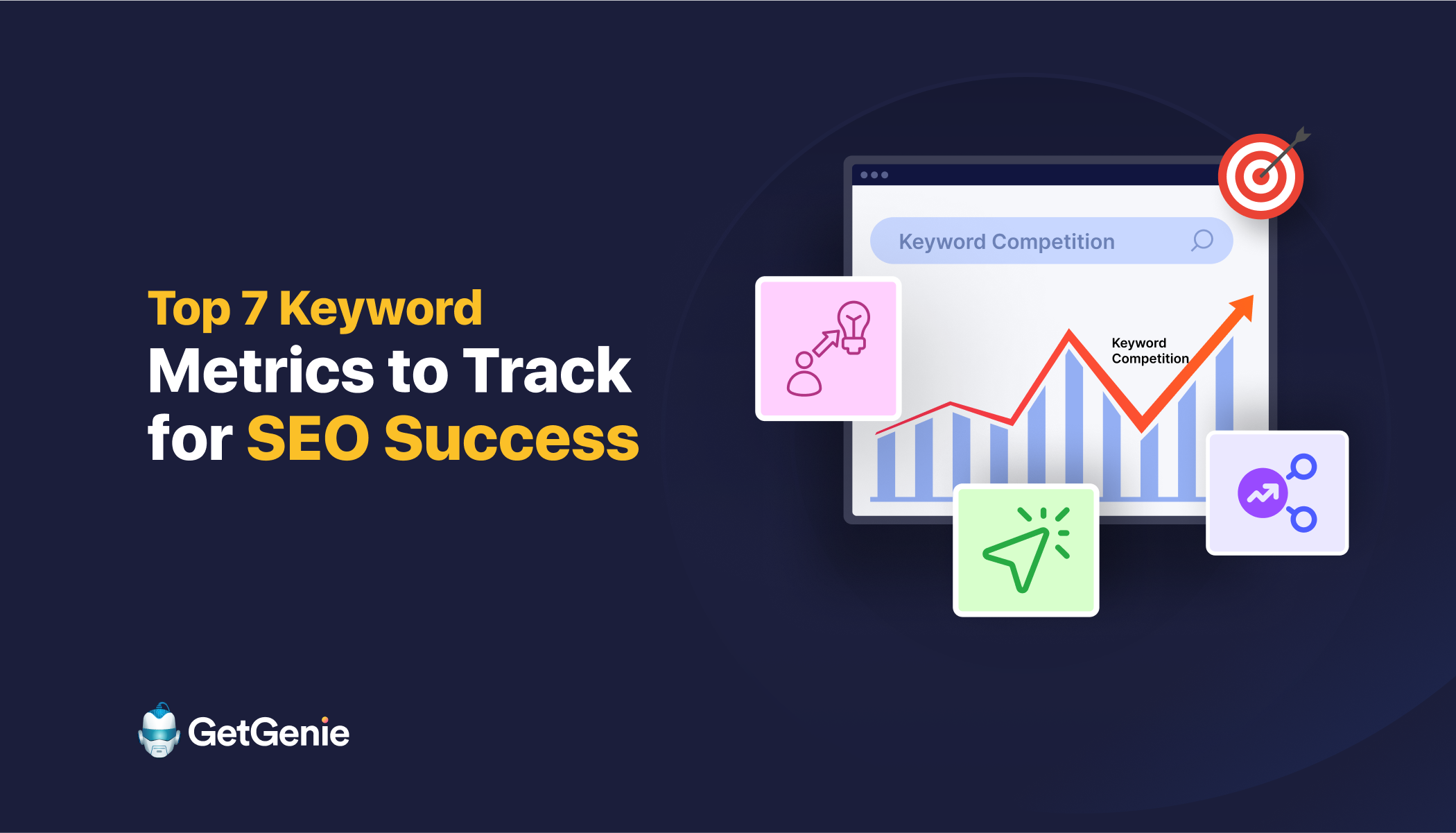
snabb överblick
To achieve SEO success, you need to track the right keyword metrics that highlight demand, competition, and growth opportunities. Here, I have explained seven key metrics, including search volume, keyword difficulty, cost per click (CPC), click-through rate (CTR) potential, ranking position, SERP features, traffic potential & trends over time. These metrics reveal which keywords can drive visibility and conversions, helping you attract qualified traffic and achieve steady growth. I have shown with tools like GetGenie how to find KW metrics & also track insights effectively.
SEO isn’t just about chasing the biggest numbers; it’s about tracking the right keyword metrics. It’s about understanding which keyword data actually moves the needle.
While search volume may look impressive, relying on it alone can waste time and resources. If you observe the competitive landscape, the real game-changers are metrics that reveal intent and highlight opportunities. They also help prevent pitfalls like keyword cannibalization while pointing to the keywords that actually drive visibility, rankings, and conversions.
In this blog post, we’ll walk you through the foundational concepts behind keyword metrics and explore seven key metrics.
Let’s begin.
Understanding Keyword Metrics
Keyword metrics are the numerical values that help you evaluate and prioritize search terms for your SEO strategy. They provide direction on which keywords can realistically elevate your web presence. At the same time, they highlight keywords that may waste effort or fail to deliver results. These values serve as a compass for you.
Rather than treating each metric in isolation, successful SEO strategies blend multiple indicators. For example, you can work with demand, difficulty, and intent to form a complete picture. This holistic approach guides smarter decision-making.
7 Important Keyword Metrics That Matter
Here, we’ll discuss 7 important keyword metrics that help you focus efforts on keywords that deliver measurable results.
1. Search Volume
Search volume shows the frequency of search or how often people look up a keyword each month. A higher search volume for a keyword indicates that many people are currently searching for it. If you optimize your content with this keyword at the right time, it will help to bring in more traffic. Make sure to balance popularity with relevance to your audience. To check the search volume of your targeted keywords, there are quick tools. For example, the Sökordsforskning feature of GetGenie AI. If your main keyword is AI agent, you’ll get to know the search volume (SV) for it easily.
Here, SV 7.39M tells us that the keyword is searched over 7 million times per month. It indicates extremely high search volume. This can be your untapped opportunity if you utilize it to optimize your content well.
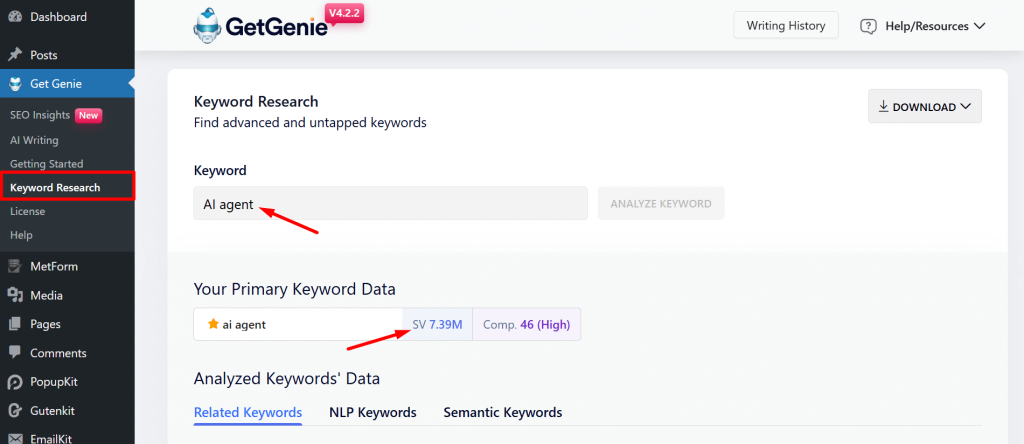
2. Keyword Competition
The keyword competition refers to the difficulty of ranking a keyword on the first page. Keyword difficulty score reflects factors like competitor authority, content relevance, and backlink profiles.
Let’s clear it with an example. Say a broad term like AI agent has high competition, while a more specific phrase such as AI agent for customer support automation, usually has lower competition and offers better ranking opportunities.
However, choosing the right balance between broad and long-tail keywords can significantly improve your SEO strategy.
Look at the image, we tried the Sökordsforskning feature of GetGenie to find the competition level of the keyword AI agent. It shows Comp. 46 (High). The label indicates that many authoritative websites are already competing for this keyword.
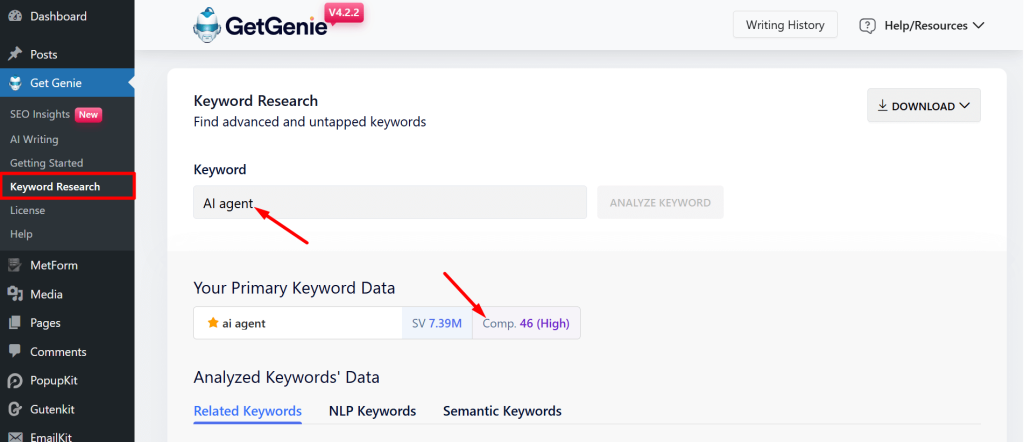
3. Search Intent
Search intent defines why users perform a search. They may look to learn something, find a specific website, or make a transaction. Understanding intent can help you shape content that answers your target audience’s needs.
Here are the types of search intents:
- Informational: When you want to learn something, you search for explanations, answers, or tutorials. For instance, ‘what is search intent,’ ‘history of digital marketing,’ and related things. The best content for you is blog posts, guides, how-to videos, or infographics.
- Navigational Intent: If you want to get to a specific site or brand, you search for things like ‘LinkedIn login’ or ‘Nike official site.’ The most helpful content for you is clear landing pages, homepages, or app links.
- Transactional Intent: Once you’re ready to buy or act, you search for things like ‘buy iPhone 15 online’ or ‘order sushi near me.’ What serves you best here are product pages, service pages, or pricing pages.
- Commercial Investigation Intent: When you’re comparing options before deciding, you search for things like ‘best SEO tools 2025’ or ‘MacBook Air vs MacBook Pro.’ The best content for you is reviews, comparisons, and “top 10” lists.
4. Keyword Cannibalization
If multiple pages on your site target the same keyword, you might face keyword cannibalization. This SEO issue occurs when the pages compete against each other in search rankings.
It often dilutes authority and confuses search engines about which page is most relevant. As a result, none of the pages may rank as high as they could if the focus were consolidated.
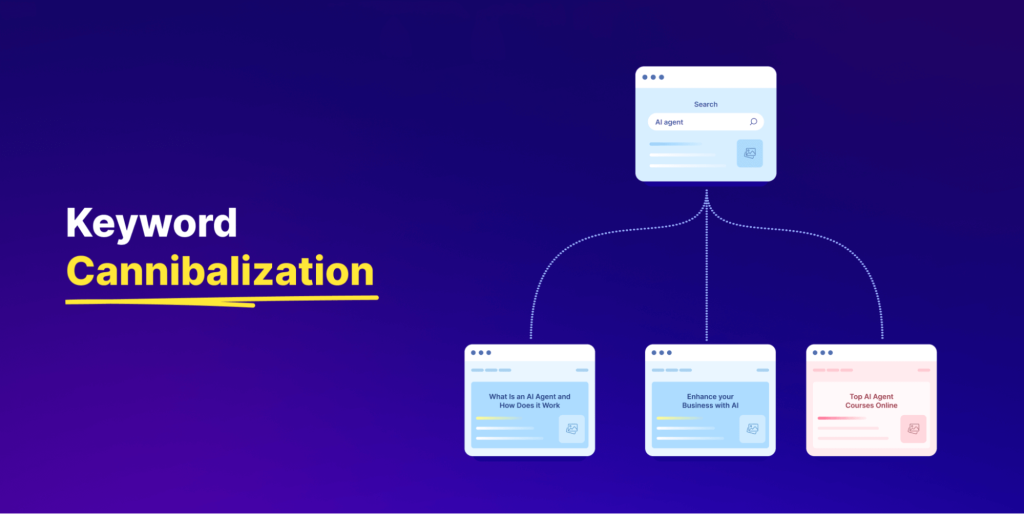
Let’s see the example, imagine you have three blog posts on your site, What Is an AI Agent and How Does it Work, Enhance your Business with AI agent, and Top AI Agent Online. All of the posts target the same keyword ‘AI agent’.
Instead of one strong, authoritative page, the site ends up with three weaker contenders, right? Yes, it’ll hurt overall performance, as Google may split ranking signals between them. The solution is often to merge, redirect, or restructure content to make one definitive page.
5. Organic Click-Through Rate (CTR)
This is another important keyword metric. Organic CTR measures the percentage of people who click your result when it appears in search listings. A compelling title tag and meta description can dramatically improve CTR even without ranking first.
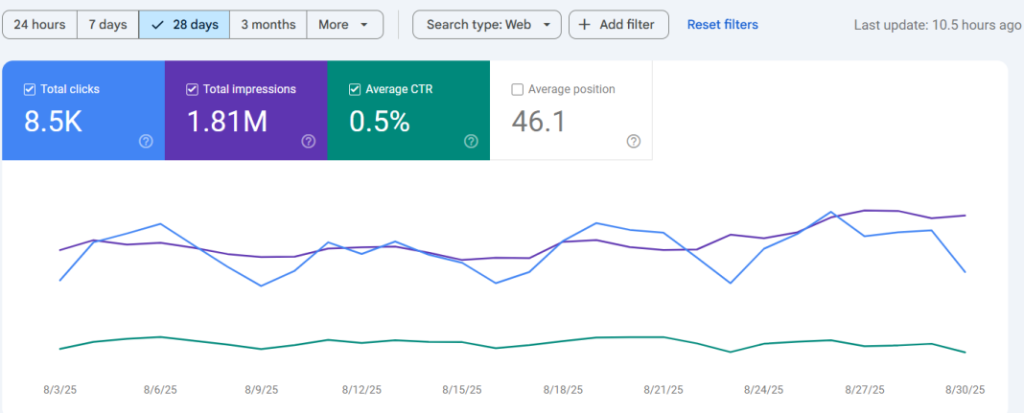
A page with a strong CTR can signal relevance to search engines, potentially boosting ranking. And for your audience, it means more traffic per impression.
6. Traffic Potential
Traffic potential encompasses visibility metrics. Like your site’s impressions, average position, and the likelihood of clicks. It estimates how many visitors a keyword can bring in if you rank well.
Tools like Google Search Console can help track which keywords are appearing but not yet clicked on. Improving content to better match intent or meta descriptions for clarity can convert impressions into valuable traffic.
7. Keyword ROI
Finally, beyond traffic, the ultimate goal is conversions.
Sales, leads, sign-ups, or any action that carries business value is your ROI. Keyword ROI considers how well a term drives your target audiences toward these goals.
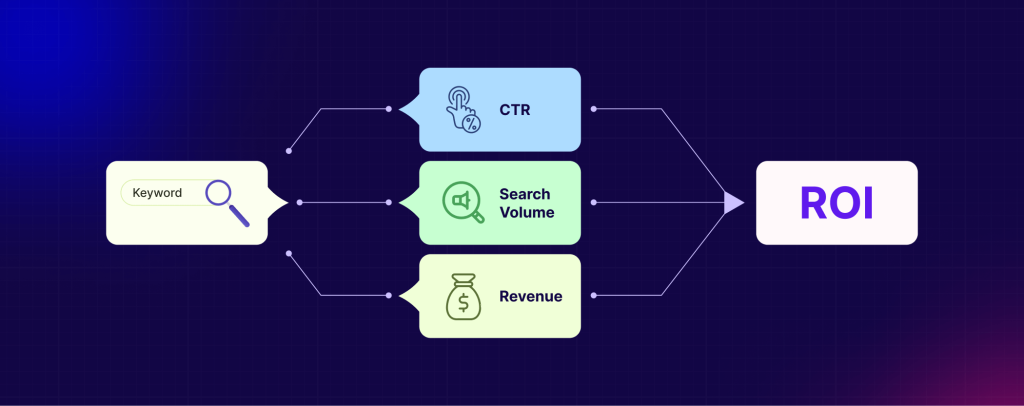
Keywords that align with your business offerings and conversion funnel, especially those showing intent to convert, deliver the best results. High-volume but irrelevant search terms rarely produce tangible outcomes.
You may find it helpful: Hur du skalar din verksamhet med AI och maximerar avkastningen på investeringen
Vanliga frågor
Sammanfattning
The keywords’ volume game is a strategic balance of demand, difficulty, intent, clickability, visibility, avoiding keyword cannibalization, and business impact. By tracking and optimizing across these seven core metrics, you’re not just attracting visitors but the right visitors. And that’s where real SEO results begin.

